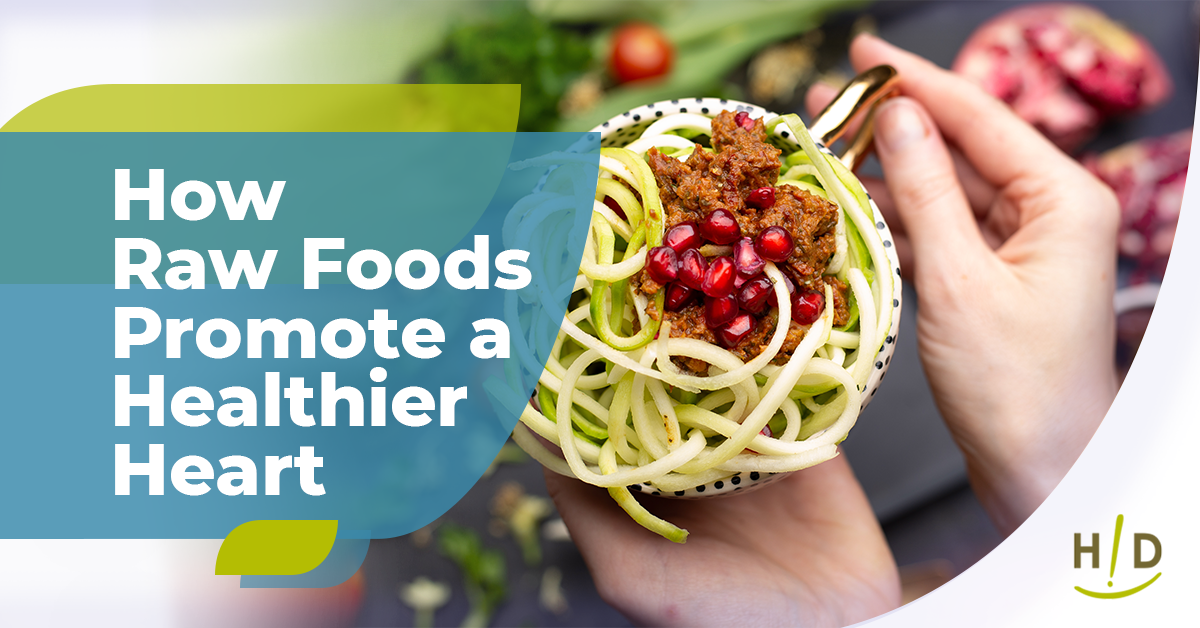Did you know that heart disease is still the leading cause of death for men, women, and people of most racial and ethnic groups within the United States?(1) It is tragically estimated that one person dies every 36 seconds in the U.S. from cardiovascular diseases.
And while genetics and other circumstances can contribute to heart disease, diet still plays one of the leading roles in heart health and can impact the risk of heart disease. It's incredible to realize that what you eat can influence every aspect of your body, and there are ways to lower your risk for certain diseases and health issues by understanding what foods work best for you.
There are certain raw foods good for your heart that you should add to your meals every day. We're happy to be able to share with you some of the most incredible and best heart-healthy raw foods to help your body maintain and possibly improve your state of health today.
Leafy Green Vegetables
Leafy green vegetables like spinach, kale, collard greens, broccoli, lettuce, and cabbage are all nutrient-packed and high in vitamin K. Vitamin K helps protect your arteries and promote proper blood clotting. Leafy greens also happen to be high in dietary nitrates, shown to reduce blood pressure.(2) New research by Edith Cowan University conducted in August 2021 shows that those who eat a diet rich in vitamin K can have up to 34% lowered risk of atherosclerosis-related (diseases of the arteries characterized by deposition of plaques on the inner walls) cardiovascular disease.(3) For this research, over 50,000 people took part over 23 years. The study found that those with the highest intakes of vitamin K1 were also 21% less likely to be hospitalized with cardiovascular disease-related atherosclerosis.(3) Each day, as little as one single cup of raw (or ½ cup of cooked) vitamin K and nitrate-rich vegetables could significantly increase heart health.Whole Grains
Published on July 13th, 2021, online within The Journal of Nutrition, a study shows a strong correlation between whole grains and a reduced risk of cardiovascular disease. With analysis of over 3,000 middle and older-aged adults that ate at least three servings of whole grains daily, it was found that they had smaller increases in blood sugar levels, blood pressure, and waist size compared to those who ate less than one-half cup serving per day.(4) The study used data from a 1970s Heart Study Offspring Cohort to examine long-term risk factors for heart disease. Changes in the following risk factors for heart disease at 4-year intervals over 18 years were analyzed: waist size, blood pressure, blood sugar, triglycerides, and HDL (the good cholesterol.) Common whole grains that can contribute to your heart and overall health include whole wheat, brown rice, oats, rye, barley, buckwheat, and quinoa. Multiple studies over the years have also connected having at least three or more servings of whole grains a day to at least a 22% lowered risk of heart disease. Note: Due to widespread use of herbicides on grain crops, it is vitally important to insure only organic grains are consumed.Berries
For a food that is both extremely tasty and good for your heart, turn toward the berry. Berries of all kinds are rich in antioxidants—substances found in certain foods known to help fight cell damage. Additionally, dietary flavonoids, a class of chemicals found in plants, positively affect blood pressure levels. Examples of flavonoid-rich foods include apples, berries like blueberries and strawberries, pears, wine, tea, and dark chocolate. Research led by Aedin Cassidy, chair and professor in nutrition and preventive medicine at Queen's University in Belfast's Institute for Global Food Security, recruited 904 adults between the ages of 25 and 82 from Germany's Population-Based Recruitment for Genetics Research (PopGen) biobank. Findings from their research revealed that those participants who had the highest intake of flavonoid-rich foods had lower systolic blood pressure levels compared to those with the lowest consumption of flavonoid-rich foods.(5) When considering adding more berries to your diet, fresh or frozen is always better than dried. Dried berries have only 20% as many phytonutrients as fresh and frozen and have far more sugar. Again, it is better to consume organic berries to avoid pesticides.Fatty Fish and Fish Oil
Two essential omega-3 fatty acids, eicosapentaenoic acid (EPA) and docosahexaenoic acid (DHA), are found in fatty fish and fish oil. The American Heart Association (AHA) has been recommending omega-3s from fish and fish oil for over 20 years to reduce cardiovascular events such as heart attacks and strokes for people who already have cardiovascular disease (CVD) and help lower the risk of CVD. Since omega-3s cannot be produced within the body, yet our bodies need it, it's vital to ensure you get enough daily omega-3s, through regular use of a good clean fish oil supplements.(6) We can get land based omega 3s from flax seed or chia seed but we cannot get the DHA we need without using a clean, well processed fish oil.What other Heart-Boosting Raw Foods Could I Add to my Diet?
There are many other raw foods good for your heart, too. Though we highlighted the most essential, here is a list of different foods to consider adding to your daily diet.- Avocados. This raw food source is rich in heart-healthy monounsaturated fats, which have been linked to reducing cholesterol levels and lowering the risk of heart disease.(7)
- Walnuts are a fantastic source of fiber and micronutrients like magnesium, copper, and manganese. Researchers from Loma Linda University School of Public health and the Lipid Clinic at the University of Barcelona in Spain released a finding in a journal article in November 2020, showing that walnut consumption in older adults reduced 6 out of 10 inflammatory blood markers, up to 11.5%(8). Eating a serving of walnuts could be beneficial for both disease management and disease prevention.
- Beans. In a review published in Advances in Nutrition, consuming beans, lentils, and other legumes can reduce the risk for cardiovascular disease. The study found that those who consumed the most legumes reduced their incidence rates for cardiovascular disease, coronary heart disease, and hypertension by as much as 10% compared to those with the lowest intake.(9)
Sources:
- https://pubmed.ncbi.nlm.nih.gov/33501848/
- https://www.cambridge.org/core/journals/nutrition-research-reviews/article/abs/role-of-dietary-nitrate-and-the-oral-microbiome-on-blood-pressure-and-vascular-tone/0052488F04342F8894B9E509029B22A7#
- https://www.sciencedaily.com/releases/2021/05/210504112604.htm
- https://academic.oup.com/jn/advance-article/doi/10.1093/jn/nxab177/6311830
- https://www.ahajournals.org/doi/10.1161/HYPERTENSIONAHA.121.17441
- https://ods.od.nih.gov/factsheets/Omega3FattyAcids-Consumer/
- https://www.ahajournals.org/doi/10.1161/JAHA.114.001355
- https://www.jacc.org/doi/10.1016/j.jacc.2020.07.071#:~:text=In%2Dtrial%20changes%20in%20main,concentrations%20of%20several%20inflammatory%20biomarkers.
- https://pubmed.ncbi.nlm.nih.gov/31728500/






